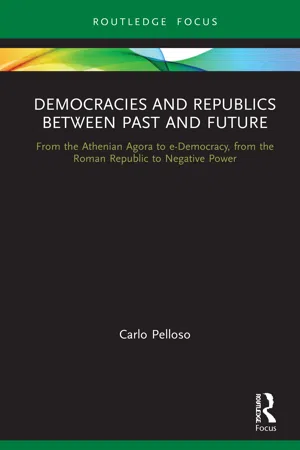
Democracies and Republics Between Past and Future
From the Athenian Agora to e-Democracy, from the Roman Republic to Negative Power
- 152 pages
- English
- ePUB (mobile friendly)
- Available on iOS & Android
Democracies and Republics Between Past and Future
From the Athenian Agora to e-Democracy, from the Roman Republic to Negative Power
About this book
Democracies and Republics Between Past and Future focuses on the concepts of direct rule by the people in early and classical Athens and the tribunician negative power in early republican Rome – and through this lens explores current political issues in our society.
This volume guides readers through the current constitutional systems in the Western world in an attempt to decipher the reasons and extent of the decline of the nexus between 'elections' and 'democracy'; it then turns its gaze to the past in search of some answers for the future, examining early and classical Athens and, finally, early republican Rome. In discussing Athens, it explores how an authentic 'power of the people' is more than voting and something rather different from representation, while the examples of Rome demonstrate – thanks to the paradigm of the so-called tribunician power – the importance of institutionalised mechanisms of dialogic conflict between competing powers.
This book will be of primary interest to scholars of legal history, both recent and ancient, and to classicists, but also to the more general reader with an interest in politics and history.
Frequently asked questions
- Essential is ideal for learners and professionals who enjoy exploring a wide range of subjects. Access the Essential Library with 800,000+ trusted titles and best-sellers across business, personal growth, and the humanities. Includes unlimited reading time and Standard Read Aloud voice.
- Complete: Perfect for advanced learners and researchers needing full, unrestricted access. Unlock 1.4M+ books across hundreds of subjects, including academic and specialized titles. The Complete Plan also includes advanced features like Premium Read Aloud and Research Assistant.
Please note we cannot support devices running on iOS 13 and Android 7 or earlier. Learn more about using the app.
Information
1 The need for new paradigms
1.1The crumbling constitution
1.2Post-democracy
Table of contents
- Cover
- Half Title
- Series Page
- Title Page
- Copyright Page
- Dedication
- Table of Contents
- Introduction: Democracies, republics and beyond: Challenges and questions
- Chapter 1: The need for new paradigms
- Chapter 2: Δημοκρατία: Back to the future
- Chapter 3: Tribuni and Res Publica: At the roots of the concurrent majority
- Index